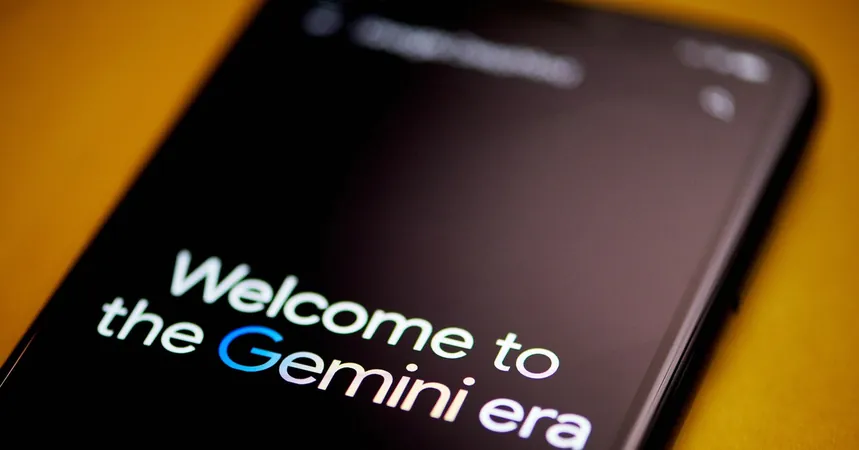
Google Unveils Gemini 2: A Leap Towards Intelligent AI Assistants
2024-12-11
Author: Sophie
Introduction
In a groundbreaking announcement, Google has revealed Gemini 2, the latest iteration of its pioneering AI model, marking a significant leap in how artificial intelligence will assist users in everyday tasks. Traditionally, Google aimed to simply organize the world's information, but its focus has now shifted towards embedding this information in AI algorithms that act as highly capable virtual assistants.
Revolutionizing User Interaction
Gemini 2 promises to revolutionize how users interact with technology. According to Demis Hassabis, CEO of Google DeepMind, the creation of a universal digital assistant has long been a dream, serving as a crucial stepping stone towards achieving artificial general intelligence — AI that can perform any task a human being can.
Enhanced Multimodal Capabilities
This new model boasts enhanced "multimodal" capabilities, enabling it to interpret video and audio more effectively and converse in natural language. It is also designed to plan and execute actions across users' computers and the web — an unparalleled feature in the realm of AI.
Improvements in Agentic Models
Sundar Pichai, CEO of Google, emphasized the improvements in agentic models, which can understand complex contexts, strategize multiple steps ahead, and act on behalf of users with their input. The potential for AI agents to transform personal computing experiences is immense; they could manage everything from booking travel to organizing documents. However, challenges remain, particularly regarding the ability of such technology to accurately handle open-ended commands without making costly errors.
Showcasing Gemini 2's Capabilities
To showcase the capabilities of Gemini 2, Google introduced two specialized AI agents: one dedicated to coding and the other to data science. Unlike existing AI tools that primarily provide autocomplete functions, these agents are capable of managing intricate tasks such as version control in programming and data synthesis for analysis.
Project Mariner: Web Automation
Another exciting development is Project Mariner, an experimental Chrome extension designed to automate web navigation. A demo at Google DeepMind’s London office illustrated its functionality when it successfully assisted in meal planning by interacting with a supermarket’s website, intelligently replacing out-of-stock items based on cooking knowledge.
Positioning Google in AI Market
The introduction of Gemini in December 2023 aimed to position Google as a leader in AI, competing with robust platforms like OpenAI's ChatGPT. The capabilities of Gemini are now on par, integrating generative AI not only into chatbots but also into various products and search functionalities.
Project Astra and Intelligent Recommendations
Hassabis also elaborated on the experimental project Astra, which allows Gemini 2 to interpret its environment using smartphone cameras and engage in conversation about what it detects. This capability was demonstrated with Gemini 2 providing detailed information about wines observed in a simulated bar setting, pointing towards its potential as an intelligent recommendation system.
Personalized User Experiences
The advanced features of Gemini 2 include the ability to remember user preferences and interests, alongside functionalities fueled by Google Lens and Maps. This not only allows Gemini 2 to provide relevant information but also leads to the possibility of creating personalized user experiences.
Challenges Ahead
Despite the promise of these innovations, the company acknowledges that the road ahead is not without challenges. Hassabis highlighted the importance of understanding user behavior and the imperative need for privacy and security considerations as AI technologies become integrated into daily life.
Conclusion
As AI continues to develop, the introduction of Gemini 2 signals a shift towards more intelligent, responsive, and versatile virtual assistants, potentially redefining how we engage with technology and navigate our lives. Will these advancements usher in a new era of personal computing? Only time will tell, but the future looks brighter than ever for AI enthusiasts!









 Brasil (PT)
Brasil (PT)
 Canada (EN)
Canada (EN)
 Chile (ES)
Chile (ES)
 España (ES)
España (ES)
 France (FR)
France (FR)
 Hong Kong (EN)
Hong Kong (EN)
 Italia (IT)
Italia (IT)
 日本 (JA)
日本 (JA)
 Magyarország (HU)
Magyarország (HU)
 Norge (NO)
Norge (NO)
 Polska (PL)
Polska (PL)
 Schweiz (DE)
Schweiz (DE)
 Singapore (EN)
Singapore (EN)
 Sverige (SV)
Sverige (SV)
 Suomi (FI)
Suomi (FI)
 Türkiye (TR)
Türkiye (TR)